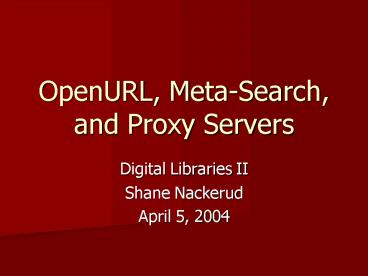OpenURL, MetaSearch, and Proxy Servers - PowerPoint PPT Presentation
1 / 30
Title:
OpenURL, MetaSearch, and Proxy Servers
Description:
Live search and retrieval using an information protocol like Z 39.50. ... Live Broadcast Search. Proxy Servers. Finding Full-Text. Database Citation. Full-Text ... – PowerPoint PPT presentation
Number of Views:122
Avg rating:3.0/5.0
Title: OpenURL, MetaSearch, and Proxy Servers
1
OpenURL, Meta-Search, and Proxy Servers
- Digital Libraries II
- Shane Nackerud
- April 5, 2004
2
From Fragmentation...
3
to Integration.
4
Some Integration Technologies
5
Finding Full-Text
Starting Point
Database Citation
Maybe
Full-Text Article
Destination
6
Finding Full-Text Context-Sensitive Linking
Database Citation
Link Resolving
Full-Text Article
7
Demo Using Ex-Libriss SFX
- http//www.lib.umn.edu
8
SFX flow AI as link source
SFX Source
SFX Menu
Target SFX
9
(No Transcript)
10
(No Transcript)
11
How Does it Work?
12
Context-Sensitive Linking
Target
Link
OpenURL Metadata
Target
Source
Link Resolver
Link
Link
Target
- Accepts metadata from source
- Resolves against local database of targets and
business rules - Builds context-senstive URLs and presents them
to the user.
13
Terms
- Sources. Any resource capable of generating an
openURL. Basically, where the user starts. - Targets. Web resources with a defined link-to
syntax. Includes such things as full-text
journals, OPACs, document delivery forms,
Internet search engines and online encyclopedias.
Basically, where the reader wants to go. - OpenURL. A general protocol administered by NISO
(Committee AX) which allows an information
resource (such as a bibliographic database,
e-print archive, or online catalog) to pass
metadata about a citation to an institution's
link resolver server.
14
Terms
- Digital Object Identifier (DOI). A unique
identifier assigned to a digital object to
uniquely identify it and provide a way to access
the object without having to know where on the
Internet it is located (the URL). A DOI may look
like this 10.1000/123456. - CrossRef. Cooperative service including nearly 80
of the worlds leading STM publishers. CrossRef
resolves the metadata, such as the citation
information in a bibliographic reference, to a
DOI. The DOI is then used to find the electronic
version. See www.crossref.org.
15
OpenURL Metadata
- Article Citation
- Author York, Neil L.
- Title THOMAS CROWLEY'S PROPOSAL TO SEAT
AMERICANS IN PARLIAMENT, 1765-1775. - Citation Quaker History 2002 91(1) 1-19. ISSN
0033-5053 - OpenURL
- http//linkresolver.lib.umn.edu?genrearticleatit
leTHOMAS20CROWLEY27S20PROPOSAL20TO20SEAT20A
MERICANS20IN20PARLIAMENT2C201765-1775titleQu
aker20Historyissn0033-5053date2002volume91
issue1spage1epage19aulastYorkaufirstNeil
auinitL - OpenURL Generator at http//demo.exlibrisgroup.co
m9003/OpenURL/article.html
16
Context-Sensitve Linking
Full Text
Link
OpenURL Metadata
MNCAT
Database Citation
Link Resolver
Link
Link
ILL
17
Sources
- Commonly include
- Abstracting and Indexing Databases
- E-Journals
- OPACS
- E-print Archives
- Digital Content Repositories
- Any other information bases that are
OpenURL-enabled
18
Targets
- E-Journals
- OPACs
- Union Catalogs
- Citation Databases
- A I Databases
- Patent Databases
- Encyclopedias
- Internet Bookstores
- Book Review Sources
- ILL/Doc Del
- Reference Services
- Local Expert Databases
- FAQs
- Other Extended Services
19
Competing with Google
- Google is easy, library searches are not
- Google provides full text all the time, libraries
only sometime - Google has one search box and a submit button,
libraries - Google is one stop searching, libraries typically
subscribe to hundreds of different targets
20
Meta-Search
- The Holy Grail of library searching
- Searching multiple, disparate targets (databases
and indexes) at once from a single search - Presenting the user with
- Results from multiple databases?
- Merged results?
- De-duped results?
- Ability to refine search?
21
Challenges
- Meta-Search technology must be able to search
multiple databases that do not - Share a common database
- Share a common thesaurus
- Share a common interface
- Share a common set of search criteria
- Keywords? All Fields? Subjects? Descriptors?
22
Search Protocols
- Different search protocol may be necessary for
each database - HTTP and screen scraping
- XML
- Z39.50
- Different configuration almost always necessary
for each database - At least one breaks every day
23
Demo
- http//fddemo.hostedbyfdi.net/
24
(No Transcript)
25
Problems
- Librarians-
- Are we dumbing down the interface?
- Worth the bang for the buck?
- Takes away the need for a reference interaction?
- Publishers
- Can they handle the increased traffic?
- No branding at the publisher level
- How are results ranked?
- Small publishers have a good chance of being
searched - Users
- Is it still too complex?
- On campus vs. off campus, how do users
authenticate to all these resources?
26
Proxy Servers
- Typical use
- Sits between the client and the desired server to
see if it can serve the content itself - Proxy server will either get the content, or it
will serve content it has already retrieved - Filters content blocks or monitors access
- Library use
- Act as a go between for off site users of
licensed resources - Part of library IP range given to licensed
resources
27
Types of library proxy servers
- URL Rewriter
- Masks IP address of user
- Must configure all the domains manually
- Rewrites all the URLs of a target page to first
go through the proxy server - Traditional
- Masks IP range for user
- No need to configure any domains
- User must configure browser to go through the
proxy server
28
EZProxy Demo
29
Problems with proxy
- EZProxy
- Must configure all the domains for licensed
resources - Time consuming and almost impossible
- Proxy servers in general
- Use IP address authentication
- Open proxy servers are becoming common
- Database vendors are getting jumpy
- Everything comes from one IP address
30
Shibboleth
- Attribute based authentication and authorization
method - User authenticates at origin institution and
receives validated attributes - User can then go to a licensed resource and tell
them he/she is from X institution - Licensed resource then looks at the valid
attributes and allows or disallows user - Based on trust between vendor and institution
- http//shibboleth.internet2.edu/shib-intro.html































